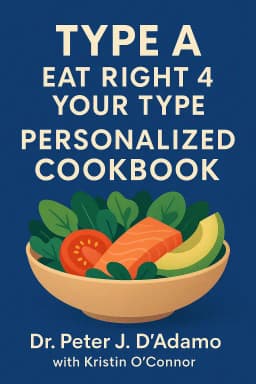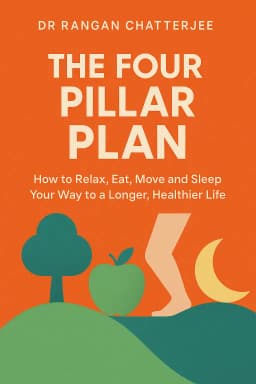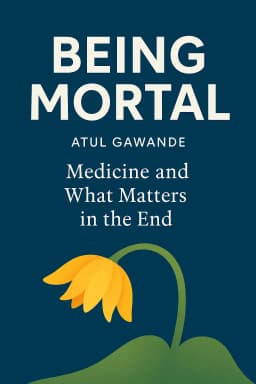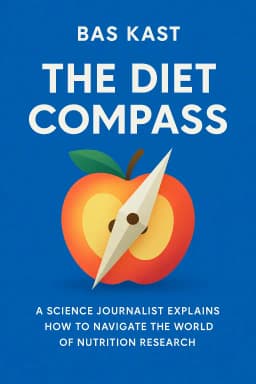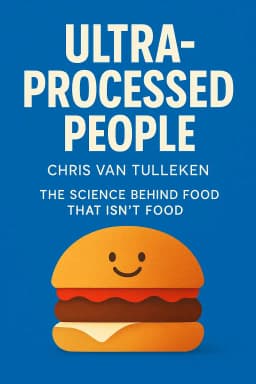
Personalized Podcast
Golden Hook & Introduction
SECTION
Orion: Imagine this: It's a warm day, you're at the park, and your three-year-old daughter has a scoop of pistachio ice cream. She gets distracted, as kids do, and leaves it on the bench. An hour later, you go to throw it away, but you notice something strange. The ice cream hasn't melted. It's not a puddle. It's just a warm, gelatinous, slightly deflated foam. What on earth is going on?
eck: That’s a genuinely unsettling image. My first thought isn't even about the food, it's a physics problem. It defies a basic law of nature. It makes you question the very substance of the thing itself.
Orion: Exactly. And that unsettling question is what kicks off Chris van Tulleken's phenomenal book, Ultra-Processed People, and it's what we're going to explore today. This isn't just a book about healthy eating; it's a detective story about what we're actually eating. We're going to tackle this from two powerful perspectives. First, we'll uncover the economic deception behind why these products, like unmelting ice cream, even exist.
eck: The 'why' behind the what. I like that.
Orion: Then, we'll explore the biological hack that explains how these substances override our natural systems, making willpower almost irrelevant. And with me to unpack all of this is eck, a curious and analytical thinker with a keen interest in nutrition and what truly motivates us. Welcome, eck.
eck: Thanks for having me, Orion. That intro has me hooked. I feel like we're about to pull back a curtain on something we see every day but don't really understand.
Orion: That is the perfect way to put it. The book’s central, and I think radical, idea is that Ultra-Processed Food, or UPF, isn't really food at all. The author, who is a doctor and scientist, argues it's a completely new category of substance. He calls it an "industrially produced edible substance."
eck: That phrasing is so deliberate. "Industrially produced edible substance." It strips away all the cultural and biological meaning of 'food' and leaves you with something that sounds like a chemical compound. It’s stark.
Orion: It is. So, let's start with that unmelting ice cream. Chris, the author, gets home and looks up the ingredients. He finds the usual suspects—milk, sugar, pistachios—but also a list of other things: xanthan gum, guar gum, carrageenan, mono- and diglycerides of fatty acids. Things you definitely don't have in your kitchen cupboard. This leads him to the fundamental question: why is this stuff in our food?
Deep Dive into Core Topic 1: The Economic Deception
SECTION
Orion: To find the answer, he meets a food-industry insider named Paul Hart, who has spent decades working for giants like Unilever. And Hart’s answer is brutally simple. He says, "Chris, it’s all about price and costs. Those ingredients save money."
eck: So the unmelting isn't a feature for the consumer, it's a side effect of a feature for the manufacturer.
Orion: Precisely. Hart explains that real ice cream, made with cream and eggs, is expensive and fragile. It melts easily, it forms ice crystals if the temperature fluctuates, which happens all the time in the journey from factory to supermarket to your home freezer. But if you replace those expensive, fragile ingredients with a carefully formulated blend of cheap gums and emulsifiers, you get a product that is incredibly robust. It can handle temperature changes, it has a long shelf life, and it can be made in a massive central factory and shipped for miles.
eck: It's a logistics and engineering solution, not a culinary one. The goal isn't to create delicious ice cream; the goal is to create a product that can survive the modern supply chain at the lowest possible cost.
Orion: You've hit the nail on the head. The book calls this "molecular replacement." You take a whole food, like a soybean or a kernel of corn, you break it down into its constituent molecules—starches, proteins, fats—and then you reassemble them, adding in these industrial ingredients to create something that mimics the texture and feel of real food. The accountants at these companies can then play what the insider calls "Whac-A-Mole" with the ingredients. If the price of one type of modified starch goes up, they just swap it for another. The end product looks and feels the same, but the formula is constantly changing to maximize profit.
eck: That is fascinating and horrifying. It turns food production into a pure materials science problem, completely divorced from agriculture or biology. It reminds me of how other industries might substitute materials to cut costs—using particle board instead of solid wood, for instance. But here, the material is what we are putting inside our bodies. The consequences are so much more intimate.
Orion: And it’s not a new idea. The book gives this brilliant historical parallel with the invention of margarine. In 1869, Napoleon III of France was worried about feeding his army and the poor. Butter was expensive. So he offered a prize for a cheap butter substitute. A chemist named Hippolyte Mège-Mouriès won by creating a substance from beef tallow. It was the birth of oleomargarine.
eck: A state-sponsored quest for a cheaper, more stable fat. That's a powerful historical precedent. It shows the motivation has always been about cost and logistics, not necessarily about health or taste.
Orion: Exactly. It's a pattern that has been repeating for over 150 years, but as you said, the scale and the chemistry have become exponentially more extreme. The book's simple rule of thumb for identifying UPF is this: if it's wrapped in plastic and has at least one ingredient you wouldn't usually find in a standard home kitchen, it's UPF.
eck: That’s a really useful heuristic. It’s not about demonizing a single ingredient, but about recognizing a pattern of industrial production. It’s a flag that says, "This was made in a plant, not on a plant."
Orion: A perfect summary. But if these substances are primarily economic products, not nutritional ones, that leads us to the next, even bigger question: how do they actually affect our bodies? This is where we get into the biological hack, and it's where the book completely upends the conventional wisdom about diet and willpower.
Deep Dive into Core Topic 2: The Biological Hack
SECTION
eck: I’m ready. This feels like the core of it. If it’s not just about sugar or fat, what is it?
Orion: Well, to find out, we have to talk about a scientist named Kevin Hall. He's a senior investigator at the US National Institutes of Health, a top-tier scientist. And for years, he was a total skeptic of the UPF hypothesis. He thought it was nonsense. His view was that a calorie is a calorie, and UPF was just a proxy for junk food—high in fat, sugar, and salt. So, he designed what he thought would be the definitive experiment to disprove the idea that processing itself mattered.
eck: I love this. A classic scientific story. He sets out to debunk a theory.
Orion: Exactly. The setup was brilliant. He took 20 volunteers and had them live in a metabolic ward for a month. For two weeks, they ate a diet of entirely unprocessed, whole foods. For the other two weeks, they ate a diet of 80% ultra-processed foods. And here is the crucial part: the two diets were perfectly matched. Same amount of calories, sugar, fat, salt, protein, and fiber. The participants were told they could eat as much or as little as they wanted. The only difference was the level of processing.
eck: So he isolated the variable. It wasn't about the nutrients on the label; it was purely about the form the food came in. This is the kind of clean experimental design that gets you real answers.
Orion: And the answer he got shocked him. On the unprocessed diet, people were satisfied and actually lost a little bit of weight. But on the ultra-processed diet, they spontaneously, without trying, ate an average of 500 extra calories per day.
eck: Five hundred? That’s a huge amount. That’s an entire extra meal. And they didn't notice?
Orion: They didn't report feeling any more or less hungry or full. They just... ate more. And over the two weeks, they gained an average of two pounds. Hall was stunned. He had proven the very hypothesis he set out to destroy. Something about the UPF itself was driving overconsumption.
eck: So even when the 'big three'—sugar, fat, salt—are controlled for, something else is at play. That's the smoking gun, isn't it? It completely dismantles the idea that it's just about reading the nutrition label and counting your macros. So what's the theory? Why did they eat more?
Orion: The book proposes a few key mechanisms, and they are all part of this 'biological hack'. First, the physical properties. UPF is soft. It's effectively 'pre-chewed.' The data from Hall's study showed people ate the UPF diet about 50% faster than the whole food diet. You can just consume it so quickly that your body's satiety signals—the hormones that say 'hey, you're full'—don't have time to kick in.
eck: So it’s a rate-of-consumption issue. You can get the calories in before your brain gets the memo.
Orion: That's a big part of it. The second part is calorie density. UPF is often very dry, which means it packs more calories per gram. And the third, which I find most fascinating, is the sensory disconnect. The book uses the example of a Pringle. The flavorings and umami taste signal to your brain, "Protein is coming! Get ready!" But what arrives is just a slurry of refined starch. Your body is left waiting for the nutrition it was promised, so the craving remains. It's a mismatch between the flavor signal and the nutritional reality.
eck: That is a profound idea. It’s a form of biological trickery. You're not just eating, you're being fed misleading data. This is a game-changer for how we think about motivation and self-control. For years, the narrative has been that people who struggle with weight simply lack willpower.
Orion: The classic 'eat less, move more' mantra.
eck: Right. But this research suggests it's not a moral failing. It's that the food itself is designed to subvert the very biological systems that regulate control. It's like trying to 'will' yourself not to be thirsty after eating a pound of salt. You're fighting your own physiology, which has been deliberately manipulated. This shifts the focus from blaming the individual to scrutinizing the product and the environment. That’s an incredibly empowering and, frankly, motivating perspective.
Orion: It is. It changes the question from "What's wrong with me?" to "What's wrong with this substance?" And that's a much more productive question to ask.
Synthesis & Takeaways
SECTION
Orion: So, to bring it all together, we've really seen two powerful, interconnected ideas from this book. First, that ultra-processed food is fundamentally an economic product, engineered for profit and logistics, not for our health.
eck: The unmelting ice cream. It’s a story about supply chains and cost-cutting, not about food.
Orion: And second, that the very physical and chemical nature of this substance acts as a biological hack, bypassing our ancient, evolved systems for controlling appetite and leading to overconsumption, almost regardless of our conscious willpower.
eck: It's a powerful one-two punch. The economic incentive creates the product, and the product's properties exploit our biology. It's a system that's incredibly difficult for an individual to fight on their own. It explains so much about the frustration people feel.
Orion: It really does. And that's why the book's final advice isn't some strict, guilt-ridden diet plan. It's a shift in awareness. The author suggests a simple, powerful first step that I think really speaks to your analytical nature, eck.
eck: I'm all ears. What is it?
Orion: Just start noticing. You don't have to change anything at first. Just use that rule of thumb we talked about: if it's in plastic packaging and has an ingredient you don't have in your kitchen, just pause for a second and label it in your mind: "This is UPF."
eck: So, not with judgment, but with curiosity.
Orion: Exactly. The author encourages you to keep eating it, but to pay attention. What does it feel like to know you're eating an 'industrially produced edible substance' instead of food? That simple act of re-labeling, of seeing the matrix, can be the most powerful first step. It's an act of intellectual rebellion.
eck: I love that. It’s not about restriction, it's about knowledge. It turns every meal, every snack, into a small act of discovery and awareness. It’s about reclaiming the narrative of what you're putting in your body. That’s a perfect takeaway for any curious mind.
